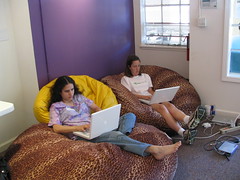 Great work to all of you who have got your blogs going - some excellent posts are already appearing. There are some really interesting introductions on the wiki Discussion and you may have noticed we have people appearing from the global community. In particular, Dave Wiley on whose design this course is based. See the acknowledgements.
Great work to all of you who have got your blogs going - some excellent posts are already appearing. There are some really interesting introductions on the wiki Discussion and you may have noticed we have people appearing from the global community. In particular, Dave Wiley on whose design this course is based. See the acknowledgements.
When posting to your blog, it is a good idea to add a label or tag to each post. For this course we are using DFLP08, so I suggest you use this one and any others which will help yo find your posts easily. This will be important later on when you are trying to connect the dots. For example, for this post I used: DFLP08, Wk 2: What is flexible learning?
This week you need to look at the material which will help you answer the question - What is flexible learning? Do not just take our word for it especially as each person will have a different take on the subject. Is the saying "anytime, anyplace, anyhow" when related to flexible learning just a misnomer?
Perhaps you can only offer flexible learning in one aspect? For example, anyplace - meaning students can access the materials wherever they are located. However to do this you may have to provide a variety of modes so that each student has access to them, and this may not be cost-effective. Are you opening a big "can of slimy worms" by even investigating the options? Is it easier to trot out the same old ways of doing things to make life easier?
Generally people investigate flexible learning options because they want to be more creative in their teaching, make it more interesting for themselves and their students, access learners who cannot study at "normal" times and on-campus etc, etc.
The danger of course in becoming more flexible, is that you can easily become inflexible but in a different way. For example, if everything goes online - this can be very inflexible for many students.
So what exactly is flexible learning? No easy answer is there? Especially as all of you will have different ones, and that is why it is so exciting and scarey. :O We are looking forward to reading about your ideas on your blogs.
Make sure this week that you read and comment on your blog on the reading you were given in hard copy - Collis, Betty & Moonen, Jef. (2001). Flexible learning : it's not just about distance. In Flexible learning in a digital world. Open & Distance learning Series. London: Kogan Page Ltd.
Carolyn and Steve have posted some ideas in response to this article on their blogs. Ali has also mentioned the article in her post where she addresses this week's questions.
Bron
Labels: DFLP08, Wk 2: What is flexible learning?

These distance learning universities all offer Ph.Ds.
Can anyone rank them in descending order of total students registered (Total student body population in Ph.D programs) in any type of Ph.D program.
I assume University of Phoenix is number one. Perhaps Capella or Walden is number two.
1. UOP
2. Capella
3. Walden
4. North Central
5. Fielding
6. Argosy
7. Nova Southeastern
8. A.T. Still
9. Liberty
10. Jones International
Here is an excellent list of distance learning universities. Most do not offer Doctorate/Ph.D.
If you can provide the information, please email me at:
boyd67@comcast.net
Thank you,
Boyd